 In honor of all the drug policy reform activists who worked so hard, but did not live to see the day of freedom and realization. They are true heroes of liberty and justice. Page 2: Laura Carden, Robert Lunday, Norm Major, Ralph Seeley, Ken and Barbara Jenks, Kirk Hampton, Keith David Whitaker, Roland Heyne Jr., Christie Bohling, Tom Forcade |
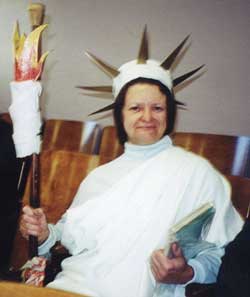 Laura
Carden Laura
CardenLaura Carden passed away on Nov. 3, 2002 at her home in Concord, California. Her son Steve and her friends Lori and Shirly were with her during the last days of her illness. She was a devoted fighter for medical marijuana, whether despite or driven by her own severe health problems. Carden's contribution to the movement is enormous. Her letters to the editor, her tireless driving, her support of patients and caregivers are legendary. She was heavily involved with the American Alliance for Medical Cannabis. She was a courageous fighter for patients rights and a major inspiration to many of us in the movement. In her last months, Laura undertook a final trip to see America and spread her message of humanitarianism and compassion. A group of friends and supporters gathered in South Tahoe to give her a salute and send off. A memorial to Laura was set up at the AAMC website, which comprises a list of victims of marijuana prohibition. People are invited to submit names for inclusion, not merely of people who have passed away, but victims of arrest, prosecution and other forms of government harrassment. Whether she was fighting for justice in a Placer County courthouse, helping at our medical marijuana schools, marching in parades with her stout cane, or driving the Canny Bus through the West Coast back-roads, Laura was a wonderful example of turning illness and anger into helping others. Her story is posted online in her own words. |
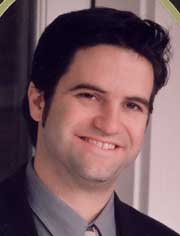 Robert
Lunday Robert
LundayOn June 9, 2002, long time Washington activist and Hemp.Net founder Robert Lunday passed away. Organizers of the Seattle HempFest were stunned by the unexpected death of Lunday, Lunday was also a member of the "Sensible Seattle" I-75 steering committee working on a ballot measure to deprioritize marijuana arrests within the city. Hemp.net has a special memorial page dedicated to people who want to help keep Robert's memory fresh and vibrant. "We miss him so much! He was so much more than met the eye. He helped out people all the time, and we never knew most of it untill after his death. One of our crew needs alot of medical attention, but simply couldn't afford insurance, so Robert paid for it, a year at a time. Each year, he donated money at tax-time, and he always wanted that money to be directed toward reform work...that's how we bought the Human Rights and the Drug War exhibit. A few years ago, I was having issues with my email server, so Robert wrote me and told me to check out my new hemp.net email addy, the one I currently use...I've never been charged a penny for it. Robert was a big fan of tall ships, and also donated alot of time and funds to the Center For Wooden Boats here in Seattle. Last year, right before the Hempfest, there was a parade of tall ships that went past Myrtle Edwards into the harbor...I had to smile and shed a few tears as I realized that Robert was blessing us in his own unique way. For the Hempfest, Roberts name will forever be memorialized. The central pathway that leads through Myrtle Edwards Park is now called the Lunday Way during the 'Fest, and the Green Ribbon he was awarded is now called The Robert Lunday Award, for achievements above and beyond the call of duty in fighting against The Drug War." -- Kevin Black, HempFest steering committee. |
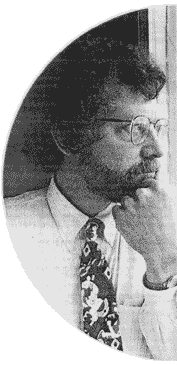 Ralph
Seeley Ralph
SeeleyRalph Seeley of Tacoma, WA, was a man of many parts: journalist, amateur pilot, out-doors man, cancer victim turned lawyer, and articulate & impassioned fighter for the right to use marijuana medicinally. In his last agonizing days he was embarking on a new project of learning to play the cello. Photograhped here by Peter Gorman, Ralph died after a long, agonizing battle with a slow growing chordoma of the spinal column over an eleven year time span. He was an articulate and passionate spokesperson for justice, having earned a law degree after the diagnosis of the cancer was made just so he could carry the battle for medical marijuana on in person from within the legal profession. Ralph was a journalist for the Tacoma News Tribune. In 1987 he was diagnosed with a chordoma. a rare cancer of the spinal column. He left the newspaper in 1988 and became a champion for the right to use marijuana as a medicine. Instead of giving up on life he went to law school in order to be more effective in challenging the laws about medicinal marijuana. In the ensuing courageous 11 year battle against his cancer he suffered more than a dozen surgeries and the loss of one lung, and underwent the great agony of many courses of radiation & cancer chemotherapy. Based on his own experience that smoking marijuana provided nearly instant relief from the severe nausea and vomiting from the chemotherapy and radiation, he became a very vocal advocate for its use. The synthetic form of THC, Marinol, was ineffective and usually couldn't be retained orally after the onset of the nausea. In 1994 he filed a law suit challenging the ban on medicinal use of marijuana, and in 1995 the Pierce County Superior Court on appeal found that the ban violated the State Constitution. The case was then appealed to the Washington State Supreme Court. There it was reversed in July 1997 on an 8-1 vote when the Court found that individuals do not have a right to drug therapy free of government police power which at that time barred medicinal use of marijuana. Seeley took his appeal for the right to use medical marijuana all the way to the Washington State Supreme Court only to be defeated there by an unsympathetic 8:1 decision. He was a most moving "poster boy" advocate in the 1997 failed initiative campaign (I - 685) for allowing medicinal use of marijuana. He died at age 49 in January of 1998 as a result of an embolus relating to his cancer. Unfortunately he did not survive to witness the triumph of the successful medicinal marijuana initiative (I-692) in November of 1998 which allowed suffering patients in Washington State to use marijuana for symptomatic relief. He was a tireless fighter against the lies that bolstered the government's immoral prohibition of marijuana, and worked heroically for justice, and the right to be free of needless suffering. in his own words "to deny people who are dying any drug is so unjust that it defies description ... it's just criminal." His work is memorialized in the Seeley Stage at the Seattle Hemp Fest |
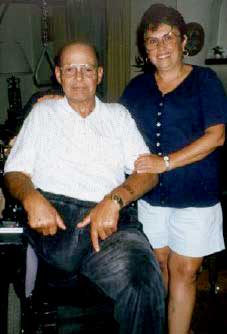 Norm
Major Norm
MajorIt is with regret that we learned of the January 28, 2003 death of Norm Major. Norm and his wife, Pat, joined the fight for access to medical marijuana when they discovered that Norm benefited tremendously from the use of cannabis. Norm found relief from pain using cannabis, without having to suffer from the side effects of the harsher prescription drugs he had been using. His story helped win the passage of the Oregon state medical marijuana law. He is survived by his wife, Pat. Norm's story is posted at the Human Rights and the Drug War website. |
|
|
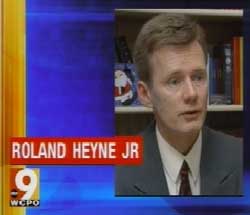 Roland
Heyne, Junior, Roland
Heyne, Junior,Cincinnati lost a freedom fighter and friend: Arlington Heights council member Roland Heyne, Jr., died July 16, 2003, at Jewish Hospital after a bout with cancer. Roland was a local Medical Marijuana Activist and Civil Rights freedom fighter as well. He took a stand against drug testing as an invasion of privacy. A quck search of the local media webpages showed that there was no shortage of news articles on Heyne. Rob Ryan, Ohio Patient Network, put a more detailed writeup on Heyne on a temporary webpage. Heyne was a fighter for principles he believed in. According to a 05-02-98 news report, Arlington Heights Council voted 5 to 0 in a special meeting to remove Heyne from his seat on several committees. Heyne said the action was taken against him in ''retaliation'' because he had recently sued the village's police chief, clerk-treasurer and mayor to gain access to village records. Heyne said he also thinks he was removed because he supports legalization of marijuana for medicinal purposes. ''I have constantly, since I have taken office, been subjected to schoolyard bully tactics by the entire council,'' he said, adding that he had no plans to resign. He later collected damages in his lawsuit. |
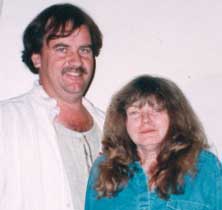 Christie
Bohling Christie
BohlingChristie Bohling had a colorful career in the marijuana underground for many years. She was part of the music scene of the 1970s and 1980s, but turned her attention to drug policy reform in the 1990s. One of Christie's greatest accomplishments was bringing the message of hemp to the Dineh (Navaho) Indians of Arizona. She was one of the people who convinced the Tribal Council to adopt a position of allowing industrial hemp to be grown on the reservation. She also helped convince the tribe to grow a test crop in the 1990s to compare "feral" American hemp with low-THC European hemp. The domesticated varieties, bred in part by the US Department of Agriculture and taken from seed stock that went wild after the WWII "Hemp for Victory" campaign, did much better than its European counterpart, bred solely for low THC content. Neither variety had enough potency to be used for marijuana. The federal DEA then stepped in and h as blocked their plans to become financially independent and self sufficient throuth hemp production. Christie felt that the environmental and economic potential of industrial hemp was the key to breaking through the Drug War lies. She began importing hemp fabrics and designed a line of hemp garments, and founded one of the first major hemp companies, Coalition for Hemp Awareness, in Arizona with her partner, Patrick, shown with her in the photo. Although riddled with health problems, she worked with Chris Conrad to draw together representatives of various hemp companies for the 1994 conference in Arizona that led to the formation of the Hemp Industries Association (HIA). She served on its board for several years and eventually succumbed to tobacco-related cancer in April 2001. |
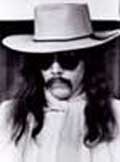 Tom
Forcade Tom
ForcadeThomas King Forcade (1945-1978) founded High Times in 1974. He was an amazing personality who touched many lives. A pot smuggler who decided to use his money to free the herb, Forcade published a magazine and helped to fund the National Organization for the Reform of Marijuana Laws, NORML. He was intimately involved and extremely influential in every counterculture movement and activity of the 1960s, including politics and the promotion of rock festivals and in the 1970s, the Punk rock rebellion. He founded the Trans High Corporation and the High Hopes Foundation. Though his untimely death is generally considered to have been a suicide, there are still conspiracy theorists who believe that he was assassinated by a government agency to stop his legalization activism. His legend and his dream lives on through the magazine and foundation he founded. |